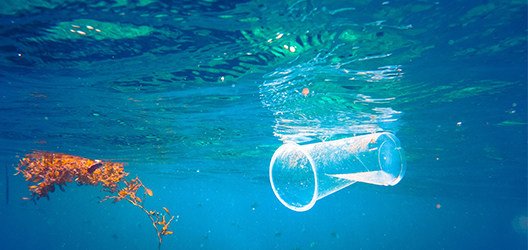8 Jun 2018
Loughborough’s waste and plastics in the sea – are they oceans apart?
Today (June 8) marks World Oceans Day – a global celebration that encourages people to protect our shared oceans.
As this year’s theme is preventing plastic pollution, the Sustainability Team has taken the opportunity to consider some of the issues around plastics and highlight what the University can do to protect the environment.
Although Loughborough is about as far from the coast as you can get in the UK, the University still has the potential to impact oceans.
Plastics in the oceans come from a variety of sources but one of the key pathways is dropped litter that gets blown or washed into brooks and streams which run into rivers and subsequently the sea.
A risk area for the University is, therefore, the litter dropped on campus on a daily basis.
In a bid to tackle this, staff, students and visitors are urged to use the waste and recycling litter bins across the campus or take their waste to the nearest building.
But what can be recycled?
Following China’s decision to ban the importation of 24 types of plastic and paper, plastic recycling is set to get harder and less tolerant of contamination.
Reusable products are of course better for the environment than single-use plastics, but using them may not always be possible or practical.
Not all single-use plastics are terrible, however – recyclable plastics that are recycled properly can be better environmentally than packaging that can’t be recycled at all.
In simple terms, the way to tell if an item is recyclable is to check if it has a recycling triangle on it with a number 1-5 in it.
To be recycled, the item must be clean – this does not necessarily mean washing it, an empty container with no visible residue can be fine as can a quick rinse – and it must be correctly segregated.
Some sources, such as packaging suppliers, may suggest compostable or biodegradable products are the solution. However the materials can only break down if they are segregated specifically for this purpose.
Nik Hunt, the University’s Environmental Manager commented: “The two key issues here are litter and our recycling levels.
“Litter breaks down over time into smaller and smaller pieces and is getting into our drinking water sources as well as the food chain.
“When it comes to recycling plastics it can be really difficult to know what to recycle but if you look for the recycling triangle with a number 1-5 then this should help.
“We currently recycle about 45-50% of waste on campus but this could be as high as 75-80% if everyone does their bit.
“I advise staff, students and all who visit Loughborough to use waste and recycling bins and segregate products accordingly – our waste really isn’t oceans apart from the sea.”
For more on waste and recycling at the University, click here. For more on World Oceans Day, visit the dedicated website.















